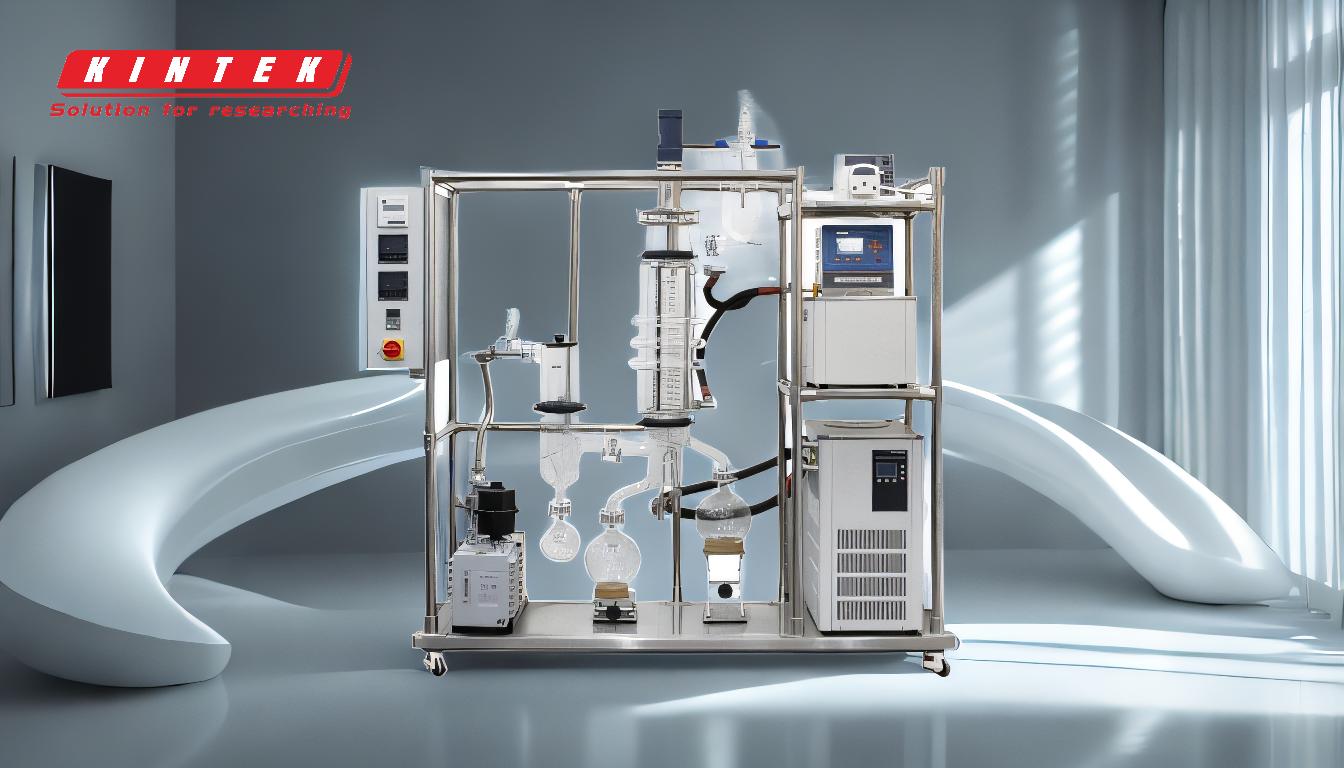Distillation under vacuum is a critical technique used to separate and purify compounds, particularly those that are heat-sensitive or have high boiling points. By reducing the pressure in the distillation system, the boiling points of the components are lowered, allowing them to evaporate at lower temperatures. This minimizes the risk of thermal decomposition, preserves the quality of the compounds, and ensures efficient separation. Additionally, vacuum conditions remove oxygen, preventing oxidation and contamination. Vacuum distillation is widely used in industries such as cannabis extraction, pharmaceuticals, and chemical processing, where precision and product integrity are paramount.
Key Points Explained:

-
Lowering Boiling Points:
- Under vacuum, the boiling points of compounds are significantly reduced. This is because the pressure exerted on the liquid is decreased, allowing molecules to escape into the vapor phase at lower temperatures.
- For example, in cannabis extraction, this prevents the degradation of heat-sensitive cannabinoids and terpenes, preserving the quality and potency of the extract.
- This principle is also applied in short-path distillation and rotary evaporation, where solvents or samples can be boiled at lower temperatures, reducing the need for excessive heat.
-
Preventing Thermal Decomposition:
- High temperatures can cause thermal decomposition of sensitive compounds, leading to the loss of valuable products or the formation of unwanted by-products.
- Vacuum distillation ensures that compounds are distilled at temperatures below their decomposition thresholds, maintaining their integrity and increasing productivity.
- This is particularly important in the pharmaceutical industry, where the purity and stability of compounds are critical.
-
Removing Oxygen and Preventing Oxidation:
- Oxygen can react with compounds during distillation, leading to oxidation and degradation of the product.
- A vacuum environment removes oxygen from the system, creating an inert atmosphere that protects the compounds from oxidative damage.
- This is essential for preserving the flavor, aroma, and therapeutic properties of extracts in industries like cannabis and essential oils.
-
Enhancing Separation Efficiency:
- Vacuum conditions improve the efficiency of separation by ensuring that only the desired compounds evaporate and condense.
- In short-path distillation, the vacuum allows evaporated particles to travel directly to the deposition target without interacting with background gases, reducing contamination and improving yield.
- This precise control over the distillation process ensures that the final product is of high purity.
-
Energy Efficiency:
- Lowering the boiling points of compounds reduces the amount of energy required for distillation, making the process more energy-efficient.
- Vacuum systems, such as those used in rotary evaporation, allow for controlled evaporation at lower temperatures, saving resources and extending the lifespan of equipment like vacuum pumps.
-
Controlled Environment:
- The vacuum level can be precisely controlled using vacuum controllers or valves, ensuring optimal conditions for distillation.
- Proper control of the vacuum prevents issues like explosion boiling and ensures consistent results.
- This level of control is crucial in sensitive applications, such as the production of high-purity chemicals or pharmaceuticals.
-
Applications Across Industries:
- Vacuum distillation is widely used in industries such as cannabis extraction, pharmaceuticals, essential oils, and chemical processing.
- In cannabis extraction, it preserves the delicate terpenes and cannabinoids that contribute to the product's therapeutic and sensory properties.
- In pharmaceuticals, it ensures the stability and purity of active ingredients.
By leveraging the principles of vacuum distillation, operators can achieve efficient, high-quality separations while minimizing the risks associated with high temperatures and oxidation. This makes vacuum distillation an indispensable technique in modern chemical and industrial processes.
Summary Table:
| Key Benefits of Vacuum Distillation | Details |
|---|---|
| Lowering Boiling Points | Reduces boiling points, enabling evaporation at lower temperatures. |
| Preventing Thermal Decomposition | Distills compounds below decomposition thresholds. |
| Removing Oxygen | Prevents oxidation and contamination. |
| Enhancing Separation Efficiency | Ensures high-purity product yields. |
| Energy Efficiency | Reduces energy consumption and equipment wear. |
| Controlled Environment | Precise vacuum control for consistent results. |
| Applications | Widely used in cannabis, pharmaceuticals, and chemical industries. |
Discover how vacuum distillation can optimize your processes—contact our experts today!












